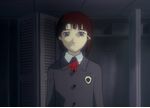I've been watching a very unpopular anime recently. Someone commented under the anime: "This is like a mental hospital from which you can't escape. That sense of helplessness will spread from the world inside the anime, eroding the audience's life." Through the screen, in the real world While peeping into a girl's life in fantasy, the audience's own spiritual world is slowly collapsing. The footsteps of Tata Towers, the high-voltage electric current, and the dripping water droplets are all manipulating the audience's emotions. It not only condenses deep-rooted fear, but also raises all kinds of thought-provoking and chilling questions: what is real and what is fake?
This anime is Reine. Lingyin is an experimental anime with no intention of facing the public. It is precisely because of this that it can explore all kinds of obscure, risky, and even anti-social issues without any scruples. The anime revolves around Reine, a junior high school student who has always been self-doubt. Through the theme of cyberbunk science fiction, it brings out a person's path to find self-worth. On that road, Reine asked herself many philosophical and psychological questions, including the collective unconscious and existentialism.
Lingyin believes that there is an inseparable connection between people, no matter where we go, our thoughts will be changed because of others. Here she introduces the concept of the collective unconscious in psychology. The famous psychologist Freud once likened human consciousness to an iceberg floating on the sea. The iceberg on the sea is our surface consciousness, that is, the preconscious; below the sea is our inadvertent subconscious. The sea under the iceberg is the collective unconscious, a subconscious shared by all human beings. This means that all human beings are sharing a "database". This can explain why Newton and Leibniz invented calculus at the same time, and why Tolkien and Huanzhuzhu live on opposite ends of the world, but the styles of their novels are strikingly similar.
The composition of Lingyin's worldview is also inseparable from the collective unconscious. First, consciousness is a product of social history, and the network between people is the foundation of society. Society is equal to everyone's consciousness, so no matter how far people go, they are all connected. After having the foundation, Lingyin added time to her worldview, and the time in Lingyin's world is reflected by memory. She believes that the reappearance of past consciousness is memory. Therefore, memory is also inseparable from consciousness, it can also be said to be the product of consciousness. And memory, consciousness, the network between people, etc., can be manipulated. Finally, Lingyin added the concept of "God" to her world. In Lingyin's world, "God" is herself, which sounds absurd, but it makes sense. She believes that "No one remembers, there is no existence." In the previous chapter, it was also mentioned that memory is also inseparable from consciousness, so this is the same as "a tree falls in a forest and no one is nearby to hear it, it Does it make a sound?" The same axe works, that is, "The moment I close my eyes, the world disappears with it."
In addition to these obscure philosophical issues, Lingyin explores issues that are very advanced and innovative. Lingyin is an anime from 1997, but it has already taken into account the changes brought about by the Internet. For example, currency decentralization, virtual reality (the so-called VR), anarchic network society and so on. People indulge in the bright and beautiful online world, reflecting the emptiness and loneliness in the real world. At the same time of emptiness, there will be a question of identity. Who is the bright and beautiful self in the online world? Is it possible to transmit one's own consciousness into the network? If that's the case, why do you need the flesh?
"Present day, present time" is Ling Yin's famous phrase. The memories of the past are not necessarily real, the future is unpredictable, only the feelings of the present moment are real.
View more about Serial Experiments Lain reviews











